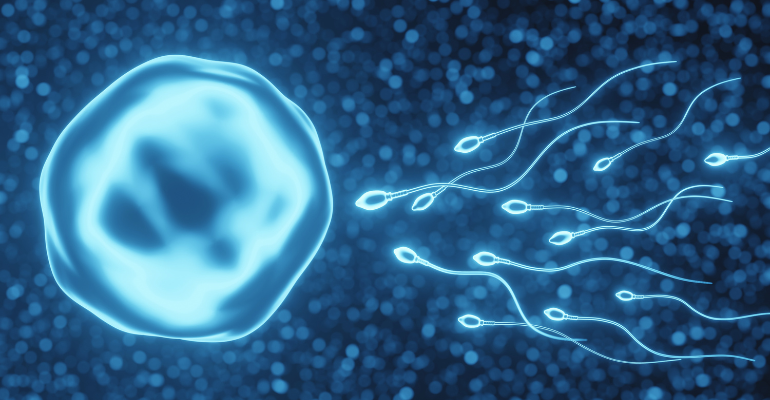Fertility for males depends significantly on the quality of semen of the man. The male reproductive system includes the testes or testicles (which produce the sperms), penis, scrotum, prostate, epididymis, vans deferens and seminal ducts. The sperms mix with the fluids from the seminal ducts to form semen. This semen leaves through ejaculations via the penis. The semen carries the sperm (male gamete) which meets the ovum or egg (female gamete) in the female reproductive system, beginning the process of fertilisation.
What is Azoospermia?
Azoospermia can be defined as the condition where a man lacks sperm in his semen. The testes is surrounded by a network of blood vessels. Usually, blood flows to the testicles via an artery and out of a tiny network of veins. Azoospermia can happen due to an obstructive cause (where the flow of sperm is blocked, making it unable to leave the body) or non-obstructive cause (where the problem lies in sperm production).
What is Intracytoplasmic sperm injection?
Intracytoplasmic sperm injection (ICSI) is a fertility treatment which helps in the fertilisation of an egg. It is a very successful mode of treatment for infertile men and is used to aid the IVF treatment for infertility.
How is Intracytoplasmic sperm injection used to treat Azoospermia?
One of the most preferred modes of treatment for male infertility is In-vitro Fertilisation (IVF). It is a process carried out in the laboratory which involves combining the semen from a man and an egg from the woman. When ICSI is used in conjunction with IVF, the male partner provides a semen sample on the same day the egg is harvested from the woman. The sample is then checked for the presence of sperm cells, after which the sperm cells are separated from the plasma (semen). This is followed by the direct injection of the sperm cells into the egg for fertilisation. The fertilised egg is then transferred to the womb. If no sperm cells are present in the semen sample, they are directly extracted from the testicle or epididymis. The entire process helps bypass the natural fertilisation process of sperm selection.
What are the benefits of Intracytoplasmic sperm injection?
ICSI provides couples with a good chance of conceiving a child from their own genetic material. It provides alternate ways of extracting the sperm, in cases where the concerned individual is too anxious to ejaculate or is producing semen from which sperm cannot be extracted. Also, the process does not seem to have any effect on the future well-being of the child.
How much does an Intracytoplasmic sperm injection treatment cost?
As compared to other parts of the world, ICSI treatment is pretty affordable in India. Of course, the costs will depend on the hospital or healthcare centre you’ve chosen.
Intracytoplasmic sperm injection is a procedure that works in multiple cycles, and additional costs have to be paid for every cycle. The starting price per cycle in India is around Rs.2, 40,000 to Rs.2, 50,000 (for the basic treatments). The higher the budget, the more advanced techniques you can opt for, making for a higher success rate.
Technologies that help in reproduction and childbirth have helped facilitate many couples in having healthy babies. Opt for treatments like IVF and ICSI only after you get a go-ahead from the doctor. Also, remember to always keep the communication an open and transparent during the entire procedure.
